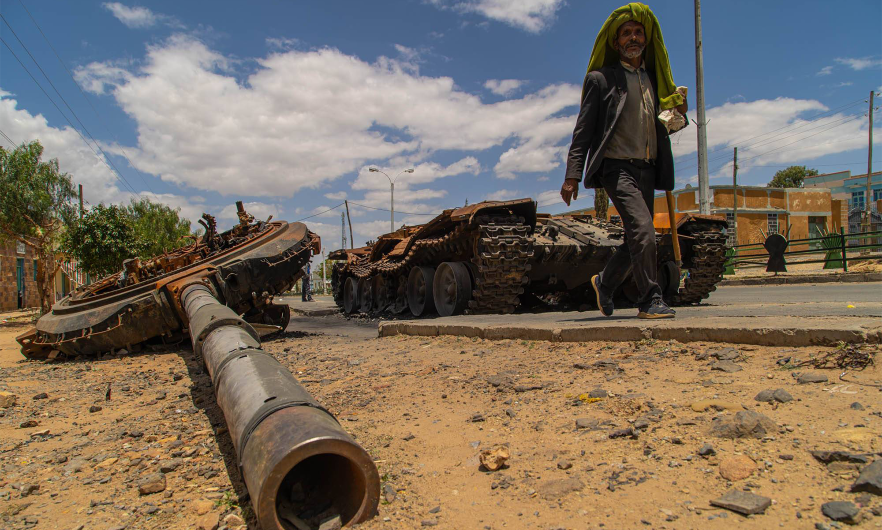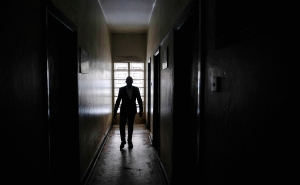The Vulnerability of Health Care in Conflict: Ukraine and Beyond

Within days of Russia’s invasion of Ukraine, a missile with cluster bombs landed outside of a hospital killing four people. It would be the first of more than 100 documented attacks in Ukraine over the last 50 days.
Russia’s invasion of Ukraine has spotlighted the long-standing issue of attacks on hospitals, medical personnel, and civilian populations during times of war.
But those attacks are by no means the only attacks on health care around the world. In an event hosted by the Center for Public Health and Human Rights and cosponsored by the Center for Humanitarian Health, four experts discussed attacks on health care in Ukraine and two other urgent health care crises demanding the world’s attention: the conflict in the Tigray region of Ethiopia and ongoing fallout from conflict in Afghanistan.
Center for Public Health and Human Rights director Chris Beyrer, MD, MPH ’91 moderated the panel, which included:
- Len Rubenstein, JD, Director of the Program on Human Rights, Health and Conflict
- Sergii Dvoriak, MD, PhD, DMedSci, Head of the Board, Founder, and Senior Scientist of the Ukrainian Institute for Public Health Policy
- Mulugeta Gebregziabher, PhD, Processor and Vice Chair, Department of Public Health Sciences, Medical University of South Carolina
- Ghutai Sadeq Yaqubi, MD, MPH, Acting Technical Director, USAID Urban Health Initiative Project, Jhpiego, Afghanistan
Galvanizing Atrocities in Ukraine
Sergii Dvoriak, who is from Kyiv and joined from an undisclosed safe location, said it’s estimated that some 120 health care facilities have been damaged, 15 health care workers killed, and 38 injured since the invasion began. But real numbers are hard to come by—documentation is hard to do in the middle of an active conflict zone, and this is likely a gross undercounting.
Millions of people, including those who have to seek out medical care in the midst of war, are affected by these attacks.
Attacks against ambulances, health workers, and hospitals have pushed critical care into basements and other unsafe places “never meant to be health care facilities,” Rubenstein said. Health care workers in conflict zones often find themselves in “moral distress,” having to make agonizing decisions about whether to prematurely discharge patients to protect them from potential attacks.
Although Ukraine may have drawn the world’s attention on these war crimes, Rubenstein said, they are not isolated incidents. In Syria, for example, more than 500 attacks on health care facilities have been carried out by Syrian and Russian forces since 2016.
Genocide and a Battered Health System in the Tigray Region of Ethiopia
In the Tigray region of Ethiopia, forces from Ethiopia, Eritrea, and Somalia have been attacking Tigrayans in a grueling conflict since November 2020. Tigrayan-born Mulugeta Gebregziabher—whose own elderly mother has been out of communication for several months—talked about the physical, mental, and psychosocial health consequences of ongoing attacks in what The Washington Post recently called “the world’s deadliest war.”
“Ethiopian leadership vowed to wipe out Tigrayans,” Gebregziabher said. In doing so, it has completely destabilized the region’s health system—which, prior to November 2020, was growing rapidly thanks to community engagement and burgeoning infrastructure.
Nearly 80% of hospitals there have been fully destroyed in the conflict; those that are operational lack water, electricity, communications, and clinical staff—many of whom have been killed or displaced. Only 13.5% of all health centers are currently “fully functional,” said Gebregziabher, a term that means something altogether different now than before the conflict began: The 360-degree blockade formed by opposing forces has cut off access to medical supplies, food, and other essential resources.
The WHO has yet to formally acknowledge any attacks on health care facilities in the region.
“Given what I see in the media, given attention by governments, there seem to be some double standards that have to end,” Gebregziabher said, quoting the late Paul Farmer: “The idea that some lives matter less is the root of all that is wrong with the world.”
Lingering Aftershocks for Afghanistan’s Health System
In a recorded video from Afghanistan, OB-GYN Ghutai Sadeq Yaqubi pointed out long-lasting impacts of conflict on health care facilities. The war in Afghanistan technically ended in August 2021, but the country’s health care system continues to suffer from a lack of supplies and workers. Although the system itself was not the target of attacks during the war, millions continue to suffer from disruptions of care.
Yaqubi cited ongoing uncertainty and an economic crisis as another reason why families are not able to seek or receive care, a situation that has resulted in a 2% rise in infant mortality, 2% rise in deaths of children under 5, a 31% drop in prenatal care visits, and a 55% decline in routine childhood immunization. The latter has been known to contribute to outbreaks of diseases like measles and polio in the region.
Protecting Health Systems Starts With Accountability
From outright attacks on health facilities to the aftermath of conflict, health systems remain vulnerable during wartime. Part of the problem, Rubenstein says, is a history of total impunity when it comes to actually prosecuting perpetrators.
First, Rubenstein said, it simply hasn’t been a priority.
The second reason has to do with the structure of the International Criminal Court. The court requires that both parties—the country or “State Party” that perpetrated the crimes, and the State Party in which the crimes took place—be members of the Court, meaning both have signed and ratified the Rome statute. Russia, for example, signed the Rome statute in 2000 but never ratified it and formally withdrew its signature in 2016 following investigations into its annexation of Crimea. In withdrawing, Russia remains outside the Court’s jurisdiction.
“That has meant that Russia has vetoed attempts to bring war crimes in Syria to international court and that has also affected other countries as well,” Rubenstein said.
An exception to this rule is that if the State Party where the crimes took place is an ICC member, they may request ICC involvement. Ukraine, for example, is a member of the ICC and therefore under its jurisdiction while Syria is not, offering hope that Russia could be held accountable for its actions in Ukraine.
Crimes like gender-based violence are even harder to prosecute simply because they’re harder to document. In Ukraine, for example, amid reports of Russian soldiers committing rape and sexual assault, “police and prosecutors collect data and [bring] criminal charges against people, but the main problems is that it’s difficult to find access to the people who committed the crimes,” Dvoriak said.
One solution, said Rubenstein, is to call some of these conflicts what they are: genocide.
“The word conveys a lot to people,” Rubenstein said. “It resonates to the world and, in one word, describes the gravity of what is happening.”
Gebregziabher laid out specific calls to action for Tigray, including holding government officials accountable, putting pressure on Ethiopia and Eritrea to end the genocidal war, and advocating for unfettered humanitarian access and lifting of the blockade around the Tigray region.
Ultimately, the panel of experts all hope that heightened awareness of these atrocities in Ukraine will serve as a flashpoint for crimes against humanity all over the world.
“One life is precious enough,” Gebregziabher said. “One health facility, one health worker is precious enough. We took an oath, we must dispense that oath and help people who are in harm’s way because of [these] man-made situations that are preventable.”
Watch the recording here.
Lindsay Smith Rogers, MA, is the producer of the Public Health On Call podcast and the associate director of content strategy for the Johns Hopkins Bloomberg School of Public Health.
RELATED:
- Health Care in the Crossfire (The Hub)
- Attacks on Health Care: Responding to the Brutal Reality (Global Health NOW)
- Schools and Programs of Public Health Join Together to Demand the Protection of Health Care Workers in Ukraine and Beyond
- War Crimes and Russia’s Bombing of Mariupol Maternity Hospital in Ukraine





